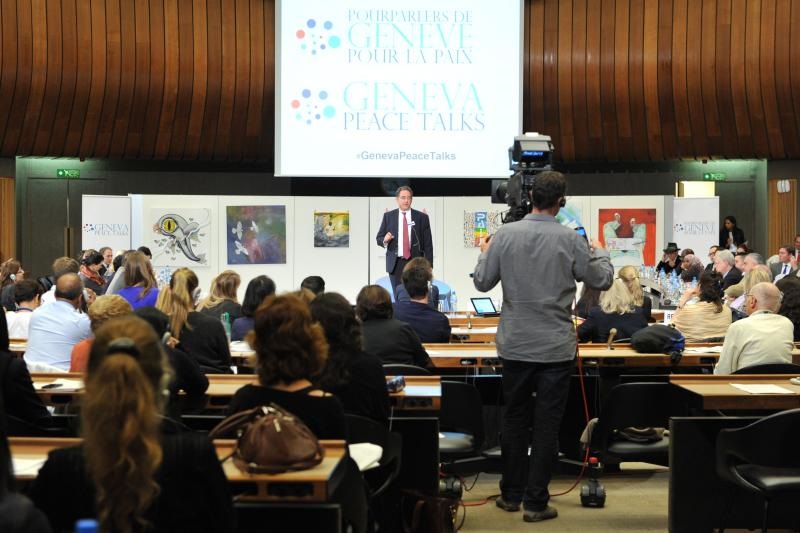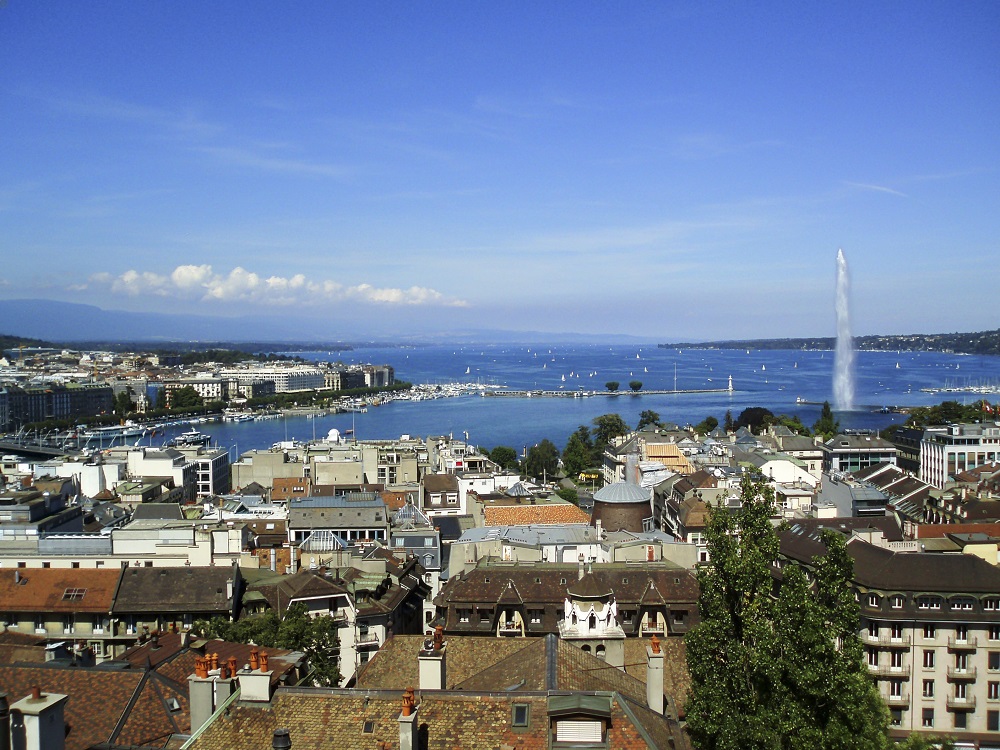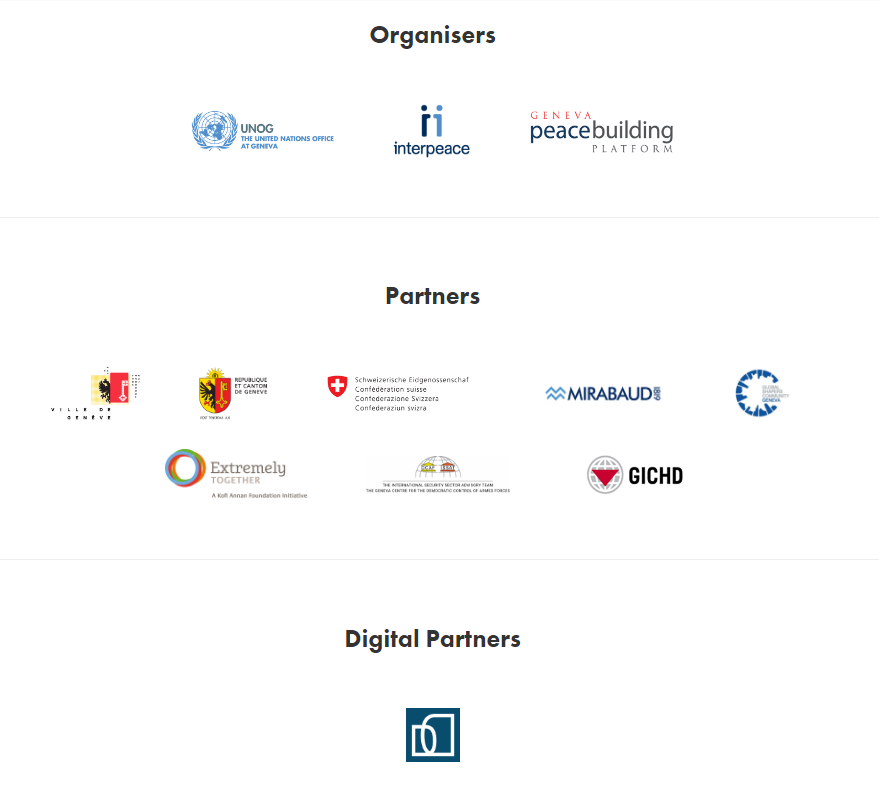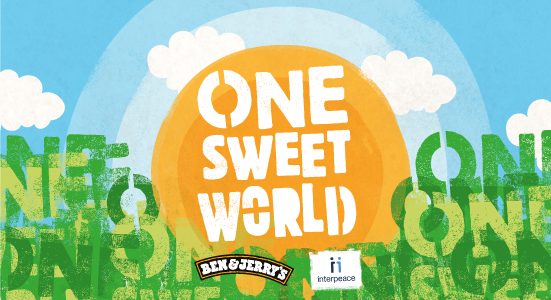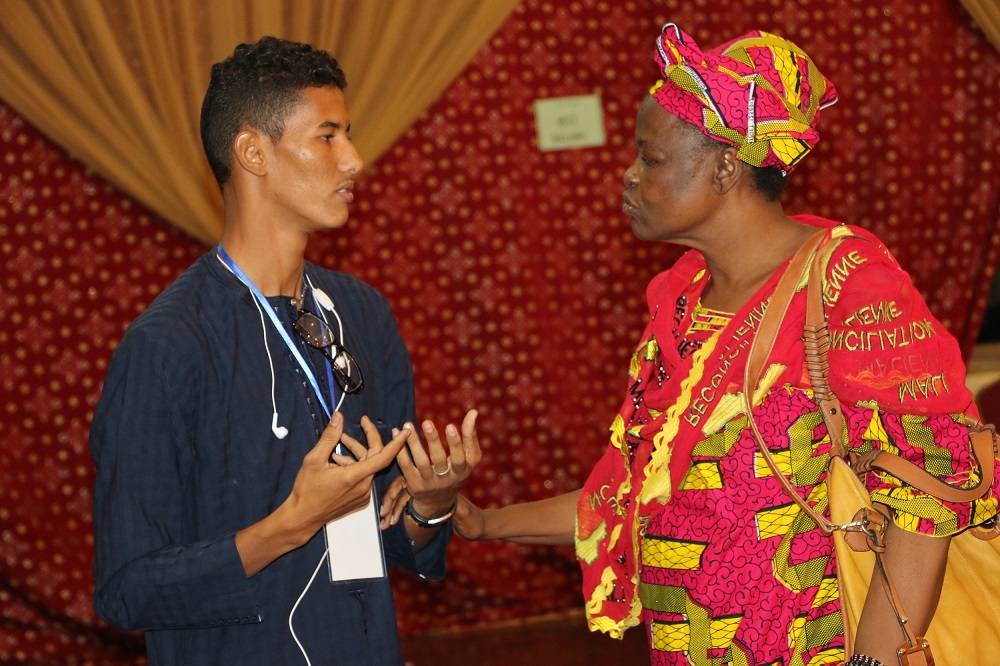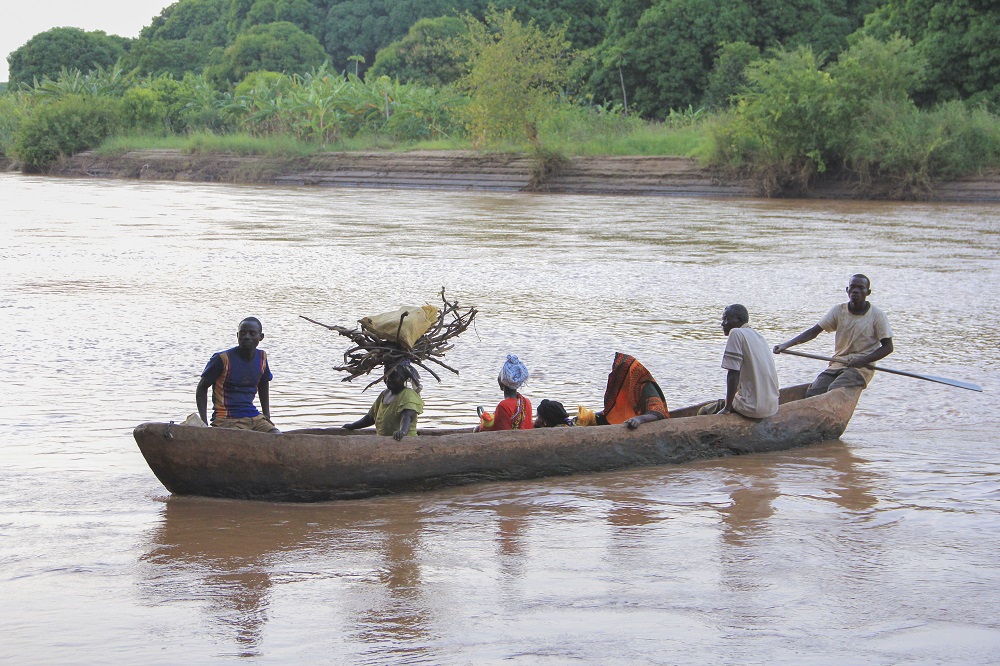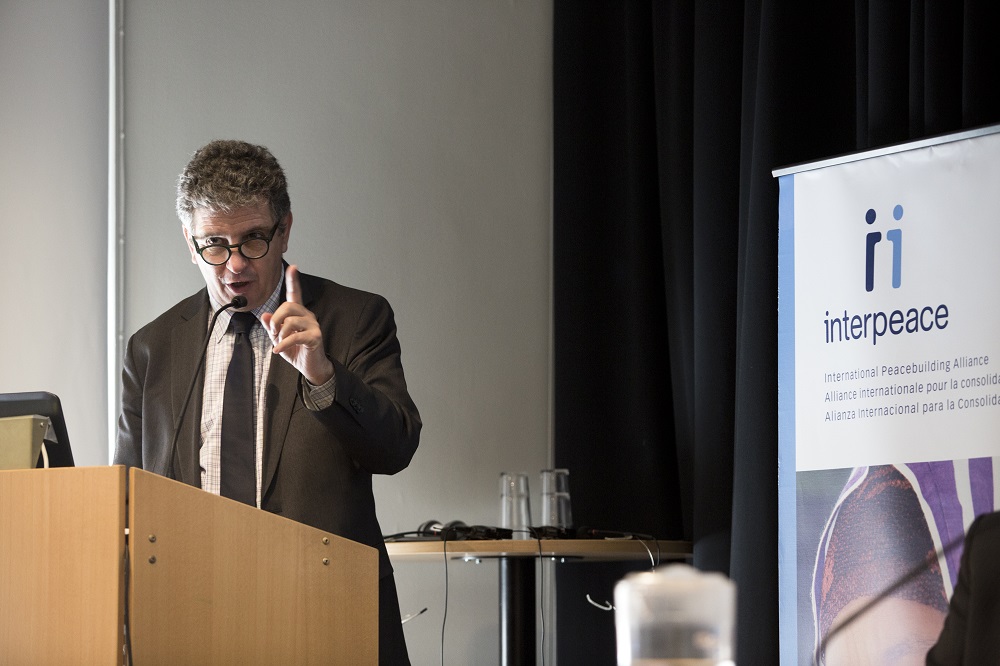Even in the most hostile and challenging environments, many peace initiatives are taking place that do not receive the attention they deserve. The 2016 Geneva Peace Talks, organized under the theme “Peace Happens!”, will unite diverse speakers such as an Iraqi orchestra conductor who plays his cello at bomb sites, young leaders who specialise in de-radicalization initiatives, and a Geneva entrepreneur using public spaces to promote interaction and human connection, to share their timely stories and practical solutions for resolving conflict.
The 4th edition of the Geneva Peace Talks will be held on Wednesday, 21st September 2016 from 16:00-18:00 in Room XVII at the Palais des Nations. This will be the flagship event in Geneva to mark the International Day of Peace, and symbolically stand for a Geneva spirit to resolve conflict through dialogue and negotiation.
The Geneva Peace Talks are a public event co-organized by the United Nations Office at Geneva, Interpeace and the Geneva Peacebuilding Platform. This year’s edition is held in partnership with the Kofi Annan Foundation, the Geneva International Centre for Humanitarian Demining, the Geneva Centre for the Democratic Control of Armed Forces and the Global Shapers Community Geneva. The event is made possible with the support of the Swiss Confederation, the Republic and Canton of Geneva, the City of Geneva, and Mirabaud Bank.
The following speakers will deliver dynamic and inspiring eight-minute talks on how they are working to promote more peaceful societies though inclusion, both in Geneva and abroad:
- Karim Wasfi, Chief conductor and Director of the Iraqi Symphony Orchestra. Karim will additionally give a musical performance with his cello.
- Mimoun Berrissoun, Founder and Managing Director of 180° Wende, he will talk about the role of young people to prevent and address radicalisation. Young Leader at the Kofi Annan Foundation’s program Extremely Together
- Ahmed Labnouj, Program Coordinator for Libya and Tunisia at Interpeace, will talk about understanding sources of stability and resilience in Libya.
- Helen Calle Lin, restaurateur, music, graphic arts and culture entrepreneur in Geneva. Helen will speak about the role of public spaces in promoting human connection.
- Lionel Aeschlimann, Managing Partner at Mirabaud & Cie and member of the Board of the Swiss think tank Avenir Suisse. Lionel will talk about the role of the banking sector in daily life and in peace.
- Mireille Widmer, security and development adviser, and Nicolas Witschard, counsellor for community action at the City of Geneva. Both are members of the “neighborhood contract”, in the Pâquis neighborhood of Geneva. They will talk about building peace at your doorstep.
- Hadja Saran Daraba Kaba, Secretary General of the Mano River Union, will speak about women and peace with a focus on West Africa.
- Marc Bonnet, Head of the Risk Management at the International Centre for Humanitarian Demining. Marc will speak about demining in Colombia as a confidence building measure to contribute to peace.
- Musical performance by POSOSHOK, a musical group mixing South African sounds with those of the rest of Africa and the world.
Accredited correspondents are most welcome to attend. Please note that registration is mandatory. You are invited to register online until Monday 19, September 2016 ici. For those unable to attend in person, the event will be streamed live on webtv.un.org et un http://peacetalks.net.
Correspondents and journalists interested in talking with individual speakers and event organizers prior to or after the Geneva Peace Talks please contact:
Rhéal LeBlanc, United Nations Information Service, Tel. +41 (0)22 917 23 36, Email: rleblanc@unog.ch
Alexandre Munafo, Interpeace, Mobile: +41 (0) 79 272 73 22; E-mail: munafo@interpeace.org or Isotta Cleps, Mobile: +41 (0) 76 818 01 99; E-mail: cleps@interpeace.org
For more information, please visit the new Peace Talks website genevapeacetalks.ch
We have a great line-up for this year’s Geneva Peace Talks to be held on 21 September. Speakers coming from diverse backgrounds will share their personal experiences, stories and ideas to highlight that everyone can contribute to peace.
Join us for this public event on the theme “Peace Happens” to celebrate the International Day of Peace. This is a popular event so make sure to register now!
DATE: Wednesday 21 September
TIME: 16h00-18h00 followed by a reception
PLACE: Palais des Nations, Room XVII
Register by 16 September here: www.genevapeacetalks.ch
The speakers include:
- Karim Wasfi, Chief conductor & Director of the Iraqi National Symphony Orchestra and Founder of ‘Peace through Arts’. Karim drew the attention of international media for his courageous acts of playing cello on blast sites of terrorist attacks.
- Fatima Zaman et un Mimoun Berrissoun, two Youth Leaders at the Kofi Annan Foundation’s program extremelytogether. Fatima is a UK civil servant who leads on policy work relating to Countering Violent-Extremism, Terrorism and Faith-related matters. Mimoun, a German-Moroccan peace advocate, is Managing Director of 180 Grad Wende, a widely recognised NGO in the field of radicalization prevention.
- Ambassador Hadja Saran Daraba Kaba is the first female who was elected substantive Secretary-General of the Mano River Union. In her current role, she looks forward to the Mano River Union becoming the driving force for full integration and development in West Africa.
- Helen Calle Lin is an eclectic and creative entrepreneur, whose vision is to make life fun in Geneva through different socio-cultural projects to revitalise public spaces in the heart of the city and turning them into friendly areas where a diversified public can meet such as Brasserie des Halles de l’Ile.
- Ahmed Labnouj is a Middle East and North African expert. He works as Programme Development Officer at Interpeace, where he is conducting a Peace Mapping exercise in different areas of Libya to understand local sources of stability and resilience to conflict.
- Lionel Aeschlimann is Managing Partner of Mirabaud and Chief Executive Officer of Mirabaud Asset Management. Mirabaud is a recognised humanist bank founded in Geneva in 1819 which has now a global presence.
- Marc Bonnet is the Head of Risk Management at Geneva International Centre for Humanitarian Demining. He has extensive experience in international cooperation with national authorities and non-governmental organizations in conflict, post conflict and development contexts.
- Mireille Widmer et un Nicolas Witschard are working on a Geneva neighbourhood contract, a joint commission between the city administration and residents. They have recognised knowledge on safety and security approaches with a focus on bridging different stakeholders to improve the livelihood of urban areas.
ALSO FEATURING
- POSOSHOK, Musicians that mix the South African sounds with those of the rest of Africa and worldwide. The songs are in Zulu and Bafia (Cameroonian language) but also in French and English.
For full biographies of the speakers, cliquez ici.
Open to the public
Register to attend (mandatory) by 16 September
ABOUT THE GENEVA PEACE TALKS
Launched in 2013, the Geneva Peace Talks is an annual, public event organized on the occasion of the International Day of Peace in partnership between the United Nations Office at Geneva, the Geneva Peacebuilding Platform and Interpeace.
This year’s edition is held in partnership with the Kofi Annan Foundationla Geneva International Centre for Humanitarian Deminingla Geneva Centre for the Democratic Control of Armed Forces and the Global Shapers Community Geneva. The event is made possible with the generous support of the Swiss Confederation, the Republic and State of Geneva, the City of Geneva, and Mirabaud Bank.
ABOUT THE PEACE TALKS
The Peace Talks is an initiative that showcases the inspirational stories of people who are making extraordinary contributions to peace. Through city specific events, people deliver a short talk, known as a Peace Talk. Speakers come from different sectors and industries and share their personal stories, ideas and practical solutions to resolve conflict. The Peace Talks is not a political platform; rather the emphasis is on practical lessons and personal stories.
You can also follow the Geneva Peace Talks at #GVAPeaceTalks and at the following link: www.genevapeacetalks.ch
Building on its work in Suède, Interpeace has joined forces with Ben & Jerry’s to spread the word of inclusion. Interpeace’s work has shown the importance of building inclusive societies. Through our partnership and campaign with Ben & Jerry’s in Sweden, we want to engage people from all walks of life and promote the idea that inclusion concerns everyone in Swedish society.
Celebrate inclusion and join the One Sweet World campaign in Sweden starting on September 2, 16:00-17:30 at the Tensta market, Stockholm’s second largest festival!
One Sweet World
Through ‘One Sweet World’, we are calling on people across Sweden to stand up for inclusion. We are asking people to share positive community stories, to celebrate local heroes and break down myths and stereotypes regarding differences.
We are inviting our friends and followers to get engaged through the One Sweet World campaign. There are no quick fixes to building more inclusive and welcoming societies, and it will take much more than a single campaign. That is why we will be adding our voice to movements already under way across Sweden, from community projects that bring people together to organizations helping to improve understanding, build common ground and ultimately drive change from the grassroots.
To learn about the One Sweet World campaign and how you can get engaged and spread the word of inclusion visit our campaign page ici
Our work in Sweden
The campaign builds on Interpeace’s work on inclusion in Sweden. In 2013, Interpeace started to explore how its proven methods could help address rising social tensions in Sweden. Today, we work with actors at the local and national level, seeking to help promote a more inclusive society.
In 2015, we launched a nation-wide research seeking to capture people’s voices on inclusion and better understand how inclusion can be increasingly fostered in Sweden. Our latest report, presenting the findings of our research led in Älvsjö (Stockholm), Luleå, Rosengård (Malmö) and Tensta (Stockholm) will be published in September 2016 (“From Margins to Mainstream: Fostering Inclusion in Sweden”, Interpeace, September 2016).
Our work has shown that exclusion and marginalization of societal groups sow the seeds for misunderstandings, mistrust, and potentially violence. While Sweden has taken great steps towards building an inclusive society, critical challenges remain especially with regard to increased discrimination and marginalization of immigrant populations from Swedish society. These issues prompt reflections about the progress of inclusion in Swedish society, and invite us to reflect creatively on how to foster greater inclusion.
In 2015, Interpeace worked in over 22 countries around the world, strengthening the capacities of societies to move towards greater peace. Firmly convinced that local ownership is a key element in peacebuilding processes, Interpeace has started to implement a resilience approach to peacebuilding programmes. From rebuilding trust and breaking barriers through innovative programming in Mali, to reducing violence by targeting structural causes in El Salvador, and fostering peace via positive transformation of violent youth groups in Côte d’Ivoire, Interpeace and its partner organizations have worked to identify and strengthen the capacities of societies, adapting our institutional principles to each context, in order to transform adversity into opportunity.
The Interpeace 2015 Annual Report, entitled Fostering Resilience for Peace, features highlights of every programme and reflects on how a resilience approach was a natural step in an organization that was founded on the conviction that peace cannot be imported, but must be built from within societies. As described by the Director-General of Interpeace, Scott M. Weber, “Resilience is not about the ability to ‘bounce back’ from tragedy, as this notion is so often misrepresented... ‘Resilience for Peace’, as we have come to frame the concept, is most importantly about the ability to transform one’s conditions so as to pen a different and more peaceful future.”
The Annual Report includes two substantive articles about how Interpeace has operationalized a resilience approach to peacebuilding through the Frameworks for Assessing Resilience programme, which was undertaken with the support of the Swedish Development Cooperation Agency (Sida) and was piloted in three different contexts: Liberia, Guatemala and Timor-Leste. The methods and approach proposed by the FAR Programme make peacebuilding more effective and sustainable by drawing on the attributes and assets of conflict-affected societies and communities themselves.
Learn more about Interpeace and our endeavors in 2015 here: Fostering Resilience for Peace.
“These ‘microbes’ we are talking about, we know them very well. They are our kids, our little brothers, we know them.” - A tailor from Abobo commune.
In the past couple of years, a violent phenomenon that began in the Attécoubé commune in Abidjan, Côte d’Ivoire, has rapidly spread to the neighboring districts of Abobo, Yopougon and Adjamé. Young men between the ages of 12 and 27 join organized youth groups, commonly referred to as “microbes” (germs). These boys are described to violently rob people on the streets and in rare cases, kill their victims. One of these youths described their state of mind: “When we go out, we are like wild dogs. We have to steal, do everything…anything to gain money.” Exclusion, lack of opportunities and inequalities are only a few of the socio-economic factors that create and reinforce the formation of these violent youth groups – stigmatization only perpetuates the conditions which lead to the existence of “microbes.”
Government officials and civil organizations have attempted to eradicate this urban violence phenomena, but with very little success. Civilians argue that police authorities do not have the necessary means to protect them against the attacks by the youth groups. In desperation, communities have gone as far as to organize self-defense actions, which have inevitably perpetuated cycles of violence in their communes.
Some citizens believe that the term “microbe” is not shameful enough to describe these young men, while others find the word appalling. Psychologically and socially, the term “microbe” has a powerful dehumanization effect. Each time community members use this term to describe the youths, they are inevitably building a barrier between them. Consequently, these young men are stigmatized and confined in negative behaviors and identities, which create vicious cycles of violence, where they remain vulnerable and cannot find a way out. “If you call me a microbes, I will act like a microbe” summarizes one youth.
These urban areas in Abidjan are desperately seeking alternative responses, which are adequate to their context. A member of the community said, “It is in our interest, us who live here, to help them. We want to find solutions, yet we do not want to admit that we know them and that we are ready to talk with them. I say and repeat, the police cannot overcome this, but dialogue will.”
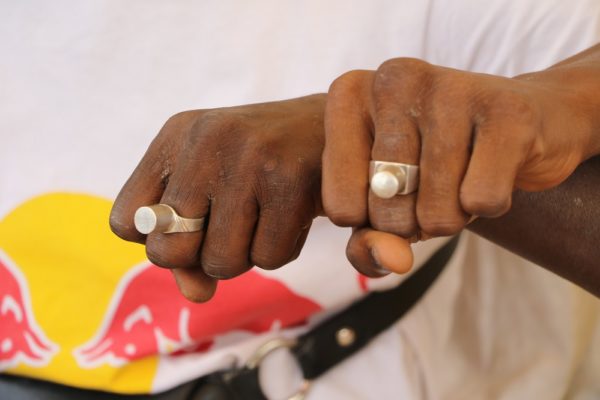
Photo credit: Indigo
In November 2015, Interpeace and its partner organization Indigo Côte d’Ivoire, visited one of the sub-districts of Abobo, to begin a pilot project, which seeks to reintegrate the targeted youth back into their communities. Dr. Séverin Yao Kouamé, Sociologist and Coordinator of Indigo Côte d’Ivoire, shares the programme insights that in order to eradicate this phenomenon there must be a holistic approach, which includes a psychosocial, economic and emotional dimension, to work on the kids’ self-esteem, and their capacity to see themselves differently and interact peacefully in society: “All these dimensions that make these kids who they are, should be dealt with. As this ‘microbes’ phenomenon is not only the result of these kids being in conflict or tension with the law, but they are also in conflict with themselves and with the Ivorian society.”
Engaging youth and building strategies from their perspectives are the most effective ways to build trust in a sustainable way amongst these youth groups and society. In order to achieve this, both Interpeace and Indigo Côte d’Ivoire, with the committed support of UNICEF, are working with 40 young men who need recognition from society, economic opportunities, education and a space to express how they see themselves within the society. Through these interactions, we were able to map violent groups in the area and truly comprehend their dynamics, in order to work together and mitigate violence in Abidjan starting with the commune of Abobo.
“Young people can break barriers, reach across divisions and forge understanding. The United Nations Security Council has finally recognized the importance of youth.” - UN Secretary-General Ban Ki-Moon
Last Friday August 12, during a speech at the University of Calgary, on the occasion of International Youth Day, UN Secretary-General Ban Ki-Moon, announced the formation of an Advisory Group of Experts for the Progress Study on Youth, Peace and Security, as mandated by Security Council resolution 2250 (2015). Secretary-General described that the group will “carry out a progress study on the youth’s positive contribution to peace processes and conflict resolution, in order to recommend effective responses at local, national, regional and international levels.”
Graeme Simpson, Director of Interpeace USA and Senior Adviser to the Director-General of Interpeace, has been appointed lead author of this Advisory Group of Experts for the Progress Study on Youth, Peace and Security. This is a wonderful recognition of the expertise that Graeme and Interpeace have been bringing to the issue of engaging youth in peacebuilding efforts for over 22 years in more than 20 countries around the world. Simpson has also worked extensively on issues related to transitional justice and the transformation of criminal justice institutions, has been consultant to both governmental and non-governmental organizations in various countries, and has published widely in books and journals.
Resolution 2250 (2015), adopted in December of 2015 by the Security Council, is the first resolution that recognizes the invaluable role youth play in building more inclusive and peaceful societies, both at a local and international level. Through the resolution, which defines youth as persons between the ages of 18 and 29, the Security Council urges Member States to recognize youth as powerful agents of change and to give them a greater voice and participation in peace processes and conflict transformations. Moreover, recognizing the threat of radicalization among young people, the Security Council, encourages Members States to empower youth, as a way to counter the spread of violent extremism. Through the use of Internet and other technologies, terrorists are recruiting young people and inciting them to commit terrorist attacks. Therefore, the resolution 2250 (2015) urges Member States to engage youth through five pillars: participation, protection, prevention, partnerships and reintegration.
The Advisory Group, has been formed to study the progress of this resolution, considered to be historic, in a time were the youth generation is the largest the world has ever known. Secretary-General described, “Nearly half of the Group’s members are young. Some of them survived conflict. One lost her father in war. Another was shot. Others were refugees.” Graeme Simpson will lead this Advisory Group over the next year, and will continue to work for Interpeace in our Representation Office in New York. The findings and recommendations of the Study will be presented to the Security Council on December 2017.
Lead author and members of the Advisory Group:
Graeme Simpson of South Africa, Director of Interpeace USA, was appointed lead author. The Advisory Group members are: Farea Al-Muslimi (Yemen), Luz Alcira Granada Contreras (Colombia), Scott Attran (USA), Chernor Bah (Sierra Leone), Ikram Ben Said (Tunisia), Malual Bol Kiir (South Sudan), Kessy Martine Ekomo-Soignet (CAR), Ilwad Elman (Somalia), Matilda Flemming (Finland), Terri-Ann Gilbert-Roberts (Jamaica), Saba Ismail (Pakistan), Thevuni Kavindi Kotigala (Sri Lanka), Nur Laiq (UK), Mieke Lopes Cardozo (Netherlands), Robert Muggah (Canada), Hussein Nabil Murtaja (Palestine), Funmi Olonisakin (Nigeria), Salim Salamah (Syria), Ali Saleem (Pakistan), Hajer Sharief (Libya), and Marc Sommers (USA).
